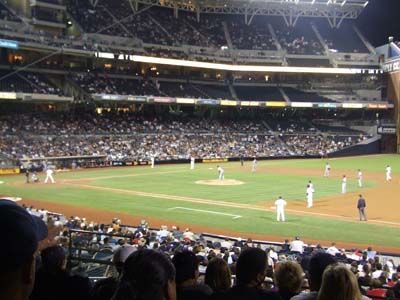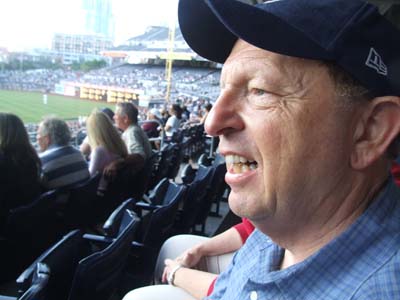|
By Donald H. Harrison
 SAN DIEGO—Baseball, like politics, can pose some moral dilemmas. SAN DIEGO—Baseball, like politics, can pose some moral dilemmas.
On Friday evening, August 7, The San Diego Padres were behind 2-1 in the bottom of the ninth when Kyle Blanks charged from first to home on a triple by Will Venable. The throw from New York Mets second baseman Andersen Hernandez arrived at the plate before Blanks did and Mets catcher Brian Schneider tagged Blanks on the hand. According to San Diego Union-Tribune sportswriter Bill Center, umpire Marvin Hudson blew the call when he signaled Blanks as safe.
Schneider and other Mets protested but to no avail. That made the score 2-2 with no outs. The rattled Mets moved an outfielder into the infield, knowing that any hit into the outfield—even if caught—would allow Venable to score from third. So they concentrated on either striking out the batters or forcing them to hit grounders which could be converted into a force-out at home, and maybe even a double play. In the process, they loaded the bases.

When the Padres’ rookie Everth Cabrera stepped to the plate, he needed to redeem himself. He had gone hitless in the game up until then, and to make matters worse, he had made a fielding error at shortstop in the first inning that had allowed the Mets to score. Cabrera worked the count against Mets pitcher Francisco Rodriguez to three balls, two strikes. Nearly everyone in the crowd stood up to see the outcome of the pitcher-batter duel. Cabrera connected on the pitch. Clearly it would go over the infielders’ heads, and Venable was bound to score. Now the only question as everyone watched together was how far would the hit go. It went into the right field stands—a homerun, a grand slam homerun, a walk-off grand slammer. After circling the bases, Cabrera, 22, was mobbed by his teammates in one of those ecstatic group hugs teams usually enjoy when they win the pennant or the World series. It was such an exciting 6-2 finish that the after-the-game fireworks were just plain anti-climactic.
What if the umpire had called Blanks out? Would the Padres still have built the momentum? Or would they have been the demoralized team? Would their rally have fizzled, leaving Venable stranded on third base? There’s no way of knowing.
Now here’s the moral dilemma. Say that you’re Blanks and for the sake of argument that you know for a certaintly that Schneider put the tag on you before you touched home plate. Should you say, “Excuse me, Mr. Hudson, but although I would benefit from your mistake, I cannot tell a lie. He tagged me. I was out”? Or is it more appropriate to simply head for the dugout and figure that higher powers than you will decide what really happened – or that umpires’ mistakes have a way of balancing each other? If a player knows he is benefitting from a “blown call,” does he have an obligation to assure victory for his team or must he instead serve the truth? What is the moral thing to do?
Go to the top of right column
|
|

**
Our daughter Sandi’s company, Balloon Utopia, counts the Padres among its clients. Perhaps the best known gig she had was the nine-foot diameter baseball made from balloons that the Padres used at Tony Gwynn (the elder)’s retirement ceremony at the end of the 2001 season. Gwynn and VIPs walked through the giant balloon baseball onto the field as their names were announced. On occasion, Sandi takes Padres' tickets in trade for her work, and she presented me with four of them at the field level for August 7th, my 64th birthday.
In celebration, Nancy and I went to the game with Howard Wayne and his wife Mary Lundberg. The four of us first enjoyed vegetarian pizza at Sammy’s Woodfired Pizza near the Horton Plaza Shopping Center, then walked through the Gaslamp to Petco Park. A former state Assemblyman and active member of the American Jewish Committee, Howard recently had announced his intention to run for the City Council seat that Donna Frye is required by California’s term-limit law to vacate at the end of 2010. On the walk to Petco, we talked about politics.
I asked Howard what he considered to be the major issue facing the city. He responded that it was the deterioration of its infrastructure. San Diego’s maintenance has been deferred for so long that Paradise is crumbling. This is serious. Deteriorated sewer lines spill their poison into storm drains. The bays and coastline of San Diego become infected with effluent. The health of people is at risk. The city has a responsibility to protect the health of its citizenry.
But the City of San Diego doesn’t have the money to be able to afford upgrading its infrastructure. Like the people who live inside its borders, San Diego is suffering from the bad economy. Problems of an underfunded pension system made matters only worse.
What to do? Here' s the moral conundrum that voters will face. Sooner or later the city will have to put a bond issue on the ballot to pay for the necessary repairs. This may require many millions of dollars, maybe billions. This won’t be a glamorous ballot measure—sewerage never is—but it will be a necessary one.
However, many voters are themselves in tough financial straits. Some fear they can’t meet their own family obligations. They’re scared about the future. Will they be willing to vote for a bond issue, which will have to be paid for by some combination of a tax and fee increase? What is the right thing to do? To vote against new taxes and fees in order to take care of immediate family obligations? Or is it to vote for new taxes in order to protect your neighbors’ and your own health?
For a bond issue to pass requires that two-thirds of the electorate vote their approval. As former state assemblyman Howard Wayne awaits the formal campaign for City Council, he has much to ponder: how can such a necessary measure be structured and presented to appeal to such a high percentage of voters?
A good answer to that question would be the political equivalent of a grand-slam home run.
|
|

